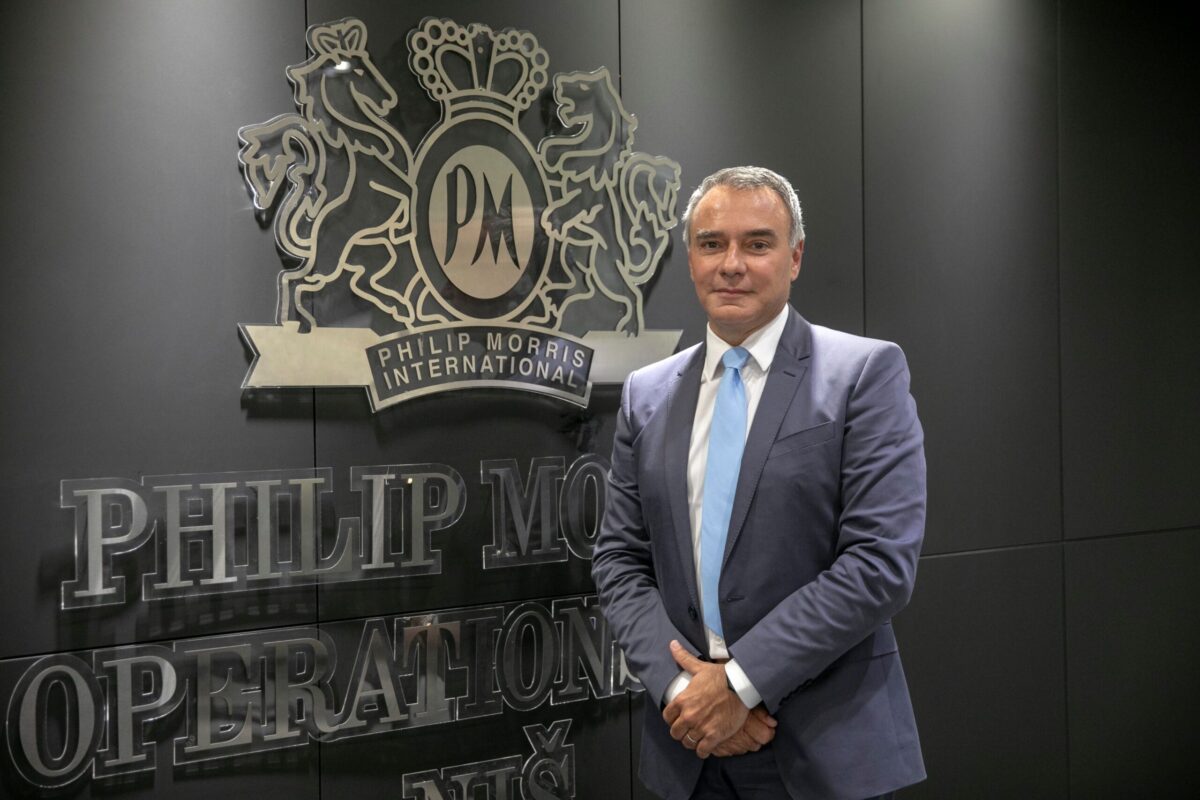We have continued to invest despite Serbia not being part of the EU

Since you had a chance to spend some time in Serbia and this Niš factory in the early phases of PMI’s business in Serbia, what are your impressions? How much has the factory changed since you were last here?
It has changed an enormous amount. I came here for the first time at the very beginning of my tenure with Philip Morris 15 years ago. We have continued to invest despite Serbia not being part of the EU; we have made the Serbian factory an integral part of a European network of factories. We invest in technology perspective, equipment to be able to make the best products here constantly, the people and capabilities, and performances. This is one of the best-performing factories that we have in Europe. Testimonial of this is the fact that one of our most important markets is Japan since the Japanese want only the best – and we managed to bring the Japanese export production production here to Serbia. We are also a Top employer and doing a lot with sustainability. We would go carbon neutral all over the world in 2025 with our internal operations. And with Serbia, we’re pretty much there. By 2024 we will have made the last investment – to expand our solar panel facilities in this place. And replace our boilers – they will be fed by the solar panels. Niš factory became the major export centre. This is no longer the niche of 20 years ago producing for the Balkans. It produces for 50 countries around the world, 80% of its production is exported. The factory also produces tobacco ready to be put in cigarettes in other factories, like in Algeria or Egypt.
The investments in Niš are not incremental. They are a quantum leap, a game changer
Does this significant investment in the Niš factory shed new light on what a small market Serbia is in terms of contribution to the transformation of the company and the mission of a smoke-free world?
Serbia is moving well in this transformation. Looking at the data, around 10% of smokers already switched to smoke-free alternatives, while 1/3 of the population smokes heavily (seen from the number of cigarettes smoked daily). So, the people resonated with our message. We are happy to be on the 20th anniversary since we can say that we are closing an important chapter while starting a new one with the new products of the future. We are starting with the new product that we have just finished testing in very few markets. I am sure during our next visit, when we finish that step, you will not be able to recognise Niš in 3 years or even after the first phase of the investment. This is not incremental, even from the manufacturing perspective. This is massive. A quantum leap. When you visit our factory in Romania, newer than in Niš, you will see the factory of the future – bright, clean, with the latest technologies, and laboratories where the contents of the products are allowed. When you bring technology, the quality control gets to a new level, the equipment is fully digital and automatic, and you get 2 things: invest in people, and connect with the people in the territory, the youngsters that are technologically advanced. As PM Brnabić said in her speech, the investments of the Government are absolutely crucial: the innovation hubs and sci-tech centres. Once you create these innovations, you create the complete ecosystem, so it becomes a fantastic place for companies to invest. It is beneficial for both people and the company. In Bologna, we had the problem 3-4 years ago: they told me that Lamborghini, Porsche, etc. are poaching our engineers, skilled workers… I explained that it is beautiful that we created people who are wanted for their skills, so the companies come to Bologna.
Mentioning the smoke-free world, what do you think can be done better so that a smoke-free world becomes a reality, not a mission? What is the future about, and what are today’s obstacles? Can you state some specific measures that governments around the world need to take for the progress you are talking about?
There are lots of things that we as a company can do better. We constantly take feedback from the consumers, making better products more satisfactory. I.e. the new product, IQOS ILUMA, is not an incremental innovation – it is a whole new level, it transforms the whole process. We have been learning how to pass the messages to the consumers daily, but there are still opportunities to improve, 7-8 years into the journey. In Europe, we are trying to gather all the countries to communicate the message, but we cannot do it alone. We are confronted in several places with obstacles. Some countries say: oh, it is a tobacco product. You cannot communicate. They do not get it is significantly better than classical cigarette, so they condemn the users to the classical, more toxic way of nicotine consumption. They prevent people from knowing. The example of Sweden is a leading one. Sweden was on nicotine pouches for 3 years prior to the EU accession. They managed to avoid the ban on nicotine pouches as an exception and commercialize it, and after 30 years, the average use of tobacco fell from 25% to 5%, so they are smoke-free virtually. They also lowered the tobacco-related illness rate. The nicotine pouches is forbidden in the EU, but there is also a tendency to forbid other type of smoke-free products. It leaves users only one option – to go to the tobacconist and buy another pack of classic cigarettes. If you don’t go one-to-one with the person, a proper trial, find the proper taste, a follow-up – well, this conversion is not full. People like the taste of cigarettes, but sometimes they revert after only a week. Prior to COVID-19, in 2018-2019, we sent thousands of people on the ground to explain the products face-to-face. In some countries like France, you cannot even tell the people these products exist, only on the shows. And the people just taste it, saying, “well, it is nothing like cigarettes,” and returning to the classics. We have 25-30% of people who go through this process and quit the classic cigarettes altogether.
Those who do not smoke should not start smoking, those who already smoke should quit. But those who do not quit should switch to alternative smoke-free products
How can we make the gestures of smokeless products as cool as the gestures of classical cigarettes? I believe that 50% of smoking is about ritual. There should be some psychological “battle” to convert to the new products.
Well, it was promoted by films, by personalities like Humphrey Bogart, lasted for several decades, and became so accepted, a part of life’s experience. To undo this and introduce a “new cool” takes an enormous amount of time and effort. Yes, they have to become attractive, but not too attractive – we want the old smokers to convert, but we don’t want to make them too attractive so the non-smokers start using them. We have to be careful with flavours, because they make the difference. Especially Spain, Germany, and France – they are “full-flavored tobacco” countries, they are attached to it. Some countries like more light or menthol. The menthol segment was, for instance, a very small segment of cigarettes in Italy, but if the switch, now approximately 1/3 of the market of smoke-free products is menthol-flavored. But they can also attract new users. We are clear with that – we want the users to switch, not to create new users.
